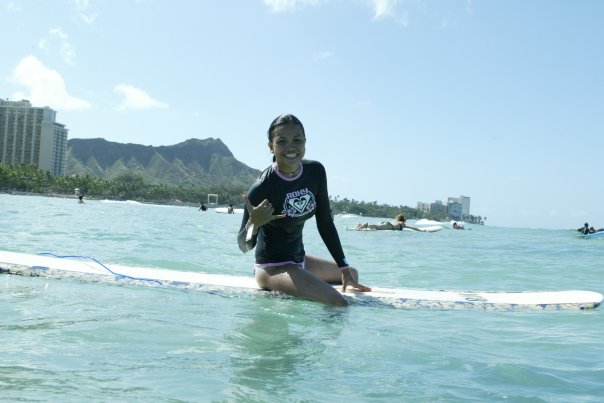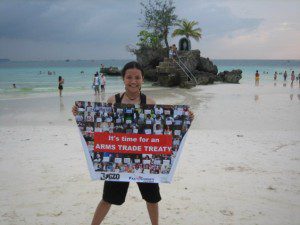 The director of the Peace and Human Rights Program at Fundació Catalunya Voluntària shares how she’s been living her passion since she was 10 years old.
The director of the Peace and Human Rights Program at Fundació Catalunya Voluntària shares how she’s been living her passion since she was 10 years old.
Tell me how you got started.
My parents have always done peace work in the Philippines. When I was ten, l followed my dad on a disarmament project in local community peacebuilding initiatives. I would even follow my dad and his colleagues to their meetings. When I was a little older, my dad asked me if I wanted to make a documentary about a community empowerment project. “If you do it, you can come with me to Australia to present it,” he told me. I formed a team, conceptualized the film and shot on Negros Island. We stayed there for 2 nights and shot what was going on in the village. The documentary focused on a ten-year empowerment program for the fisherman. My dad and his colleagues were empowering them to stop big illegal fishing vessels. They taught them how to explain that the coastal people have exclusive fishing rights in that area. They also had a coral protection campaign. That was a reality check for me. I saw how coastal people lived. They only ate rice with soy sauce and whatever they happened to catch that day. I was 16 at the time. I told my dad I would like to do more. After that, my dad introduced me to people all over the world.
What interests you most about what you’re doing now?
Now I work in a private foundation in Barcelona, Fundació Catalunya Voluntària, where I started and now coordinate the peace and human rights program. We have three tracks: capacity building, advocacy and networking. Our aim is to gather volunteers and mainstream peacebuilding work with them. We help them understand what peace really means. Most of our work is international.
Because we do training, lots of people come here, and it still surprises me—knowing the quantity of initiatives and opportunities to learn about peace and nonviolence there are in the world—that people don’t know about that stuff yet.
We work mostly with 18 to 35 year olds, but we want to target multipliers (teachers, group leaders, community leaders) so that we can ultimately reach more people.
We have an intercultural team of trainers. So for me it’s good to see how others lead workshops. And it’s always nice to reconnect with people that I’ve worked with in the past. I keep running into people I know which gives me a sense of community.
 What’s been your biggest accomplishment?
What’s been your biggest accomplishment?
Still doing what I’m doing despite the many struggles. My personal accomplishment is still keeping the fire lit. Sometimes I get really burned out by things like the financial crisis in Barcelona. We lost a lot of our resources, and yet I’m keeping on.
Biggest challenge?
I tend to forget about myself. I keep working, working, working—stressing myself out trying to be perfect. And then I realize that I forgot to have dinner or that I stayed up too late. The challenge is to do more introspection, relaxation and reflection. I have to keep reminding myself that I’m doing this work because I love it. So this year, we’re trying to launch an inner-peace training for peaceworkers—teaching centering, balancing, and nonviolent communication. This training will be more connected to emotions. We’re including theater, improvisation, aikido, and meditation.
Who or what inspires you?
The people I meet along the way who have kept me on my feet. There’s always 1 or 2 people who stand out in a training. Most people I meet during trainings are young and inspiring. My parents are also a source of inspiration. Especially my mom. She sees on Facebook that I’m organizing an event and she writes me saying she’s jealous because I have so many opportunities in Europe. She is teaching peace education to teachers, school administrators and students in the Philippines, most of the time without pay or resources. She has always been an example of a “woman for others” everything she does. Both my parents have always kept me grounded – to follow my heart, and do the things I love without asking for anything in return.
My colleagues who continue to work for peace despite different inner and external struggles—those who work for peace and have integrity around their passions and commitments—they really inspire me too. It is challenging and I admire these people… You know who you are. Thanks for inspiring me to continue…. 😉
Why is peace sexy to you? What does “Peace is Sexy” evoke for you?
For me, “peace is sexy” evokes a feeling of excitement – a feeling of having “butterflies in your stomach.” For instance, when I think of a wonderful grassroots project and start putting it into writing, I see myself smiling and really feeling very excited for the project to push through. Or on the last day of a 7-day training on conflict management when our youth participants tell me “Thanks, I learned a lot and I will use many skills when I am back home,” it gives me a feeling of “YESS!!!! All our work will be put to good use.” Working for peace makes me look forward to the different possibilities I have to change the world, and for me, this is sexy.
“Peace is sexy” to me also means being confident with ourselves and being honest with our needs and wants—to love and be loved in return, being able express ourselves from the heart, and having the heart to understand in return.
Lastly, peace for me is sexy because it is this “perfection” to which we aspire: the best that we want for ourselves, our family, our friends. Looking deeply personally, I want to have peace—inside and out—and I want to be able to live this peace.
What is a simple thing you do to create peace? What is something you do everyday?
When I was in university, my ex-boyfriend would tell me that I was really crazy because I would say to hello to random people. It made them smile, or laugh at me, but either way I made them a little happier. It makes me feel really good. That’s how I want to be treated. So that’s why I do it to others. I treat people nicely.
My dad’s friend (who is now with International Alert in the UK) and I were shopping for hats one time. As we were leaving the store, he made a point of telling me that as a customer we should treat the salespeople nicely and improve their day because they probably don’t want to be doing that job. I try to keep on doing that.
Also, I have this idea of doing something extraordinarily nice every day. For example, I saw this man looking at the stacked trays in a food court once. He was pretending he was on the phone and started eating left over food. That really broke my heart. So when I was done eating, I went and bought him a pizza. And I just left. There are lots of opportunities that come up like that. Sometimes people don’t expect it. For me it wasn’t a big deal, but for the other person it can make a huge difference.
I also try to be aware of the things that I consume, what I buy. I try to be environmentally, ethically, and fair-trade aware. Reusing, recycling, and telling others about great fair-trade products that I’ve found.
How would you like Peace is Sexy to make a difference in what you are up to?
I think I’m going to start promoting it to colleagues of mine. Making a 360 degree turn. I think it’s high time for people to see the sexy side of peace. It’s good to have a provocative nature, changing the discourse around peace. It’s hard to approach funders and get them to understand why peace is important. I hope this will help.
Where would you like to see your passion go in the next 10 years? 20 years? 100 years?
20 years from now, I hope to stay in touch with people that I have trained and see them multiply peace and have them turn out to be an example to their communities of how things should be.
Is there anything else you want to tell us?
We’ve got a great manual on mainstreaming peace, Peace Bag, which is an online toolkit for trainers or educators, and includes things like how to promote peace through games.
By the way, I’ve also tried a very sexy approach to peacebuilding, bikini campaigning. In the Philippines, my colleagues and I were trying to lobby MPs about a disarmament campaign at a conference. But it was only the next day when they saw us at the beach that they actually wanted to talk to us.


